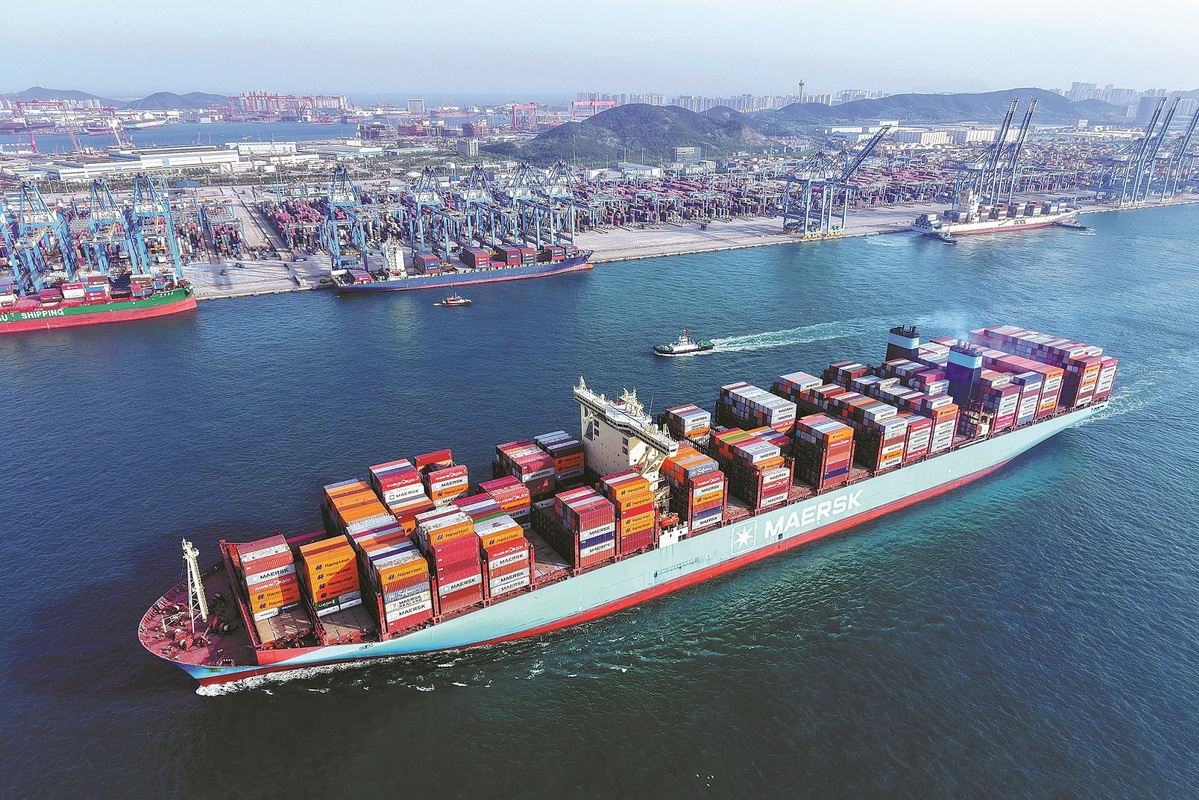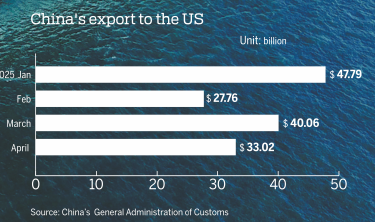关税缓和利好消息,但只是第一步 - 2025-05-19

A cargo ship carrying foreign trade containers drives out of Qingdao Port in Qingdao, East China's Shandong province, on May 12.
Chinese Vice-Premier He Lifeng, the lead negotiator regarding Sino-US trade and economic affairs, met with lead persons from the other side — US Treasury Secretary Scott Bessent and US Trade Representative Jamieson Greer — in Geneva from May 10 to 11. It was the first such high-level meeting between the two sides amid the current tariff frictions.
After a barrage of bullying tariffs and technological restrictions from the United States, China has firmly defended its own interests — being neither arrogant nor submissive — and successfully withstood Washington's pressure. In doing so, China has set a powerful example for all countries and regions, especially those from the Global South.
The launch of such a high-level meeting between China and the US has great significance. First, the softening US stance signals the failure of its maximum pressure strategy on China.
Under the banner of "Make America Great Again", Washington tried to disrupt global trade order and suppress China's economic rise through baseless fentanyl-related tariffs, unfair "reciprocal" duties, harsh tech restrictions and reckless forced decoupling from Chinese supply chains.
Yet, as China's fiscal and monetary stimulus policies began to take effect and its dual-circulation economic strategy advanced, the resilience of China's economy came into focus. Meanwhile, the US has been plagued by severe inflation risks, rising financial market volatility and a sharp decline in the dollar's credibility.
There are no winners in a trade war, but the US has shown greater vulnerability than China. In short, Washington didn't get the call from Beijing it had hoped for — and has now come to the table seeking cooperation.
Second, multilateral rules are a vital means for developing countries to safeguard their interests.
Washington's crude "reciprocal tariffs" clearly violate WTO rules and defy the logic of global economic cooperation. Although the US has tried to manipulate its international standing and cripple the WTO's dispute resolution mechanism, the actual impact on China's economy has been far less than expected.
This proves that US unilateralism cannot break China's deep integration with globalization — and also highlights that countries like China rely on the multilateral system to protect their development space.
Third, China's willingness to engage in trade talks reflects both a defense of its rights and a response to calls from businesses and consumers on both sides.
Sean Stein, president of the US-China Business Council, said that US companies "do not want tariffs and other issues to further complicate an already difficult bilateral economic relationship".
Globally, many economies have urged dialogue and cooperation between the world's top two economic powers. Singapore Prime Minister Lawrence Wong stated that ASEAN nations hope Sino-US talks can serve as "guardrails" in the relationship, warning that any escalation would bring disastrous consequences for the world.

In addition, China and the US must share development opportunities.
First, neither China nor the US can grow without the other. Since its reform and opening-up, China has undergone a dramatic transformation. Openness has been a cornerstone of its rapid economic growth and integration into globalization. A peaceful environment and a win-win approach are deeply embedded in China's development model.
China has long been a major source of goods for the US and a key destination for its services, proving that cooperation benefits both sides.
Second, the US must recognize the development aspirations of China and other emerging economies. In a globalized world, countries like China have been able to integrate rapidly and elevate their economic and geopolitical standing.
Developing countries deserve fair opportunities — based on mutual respect, equal consultation and mutual benefit. They also seek a fair voice in trade negotiations and a just global system. This is why many emerging economies continue to support multilateralism, and why the US must take these demands seriously.
Third, reforming global trade rules requires joint efforts from both China and the US. The international trading system built after World War II laid the foundation for decades of growth.
But now, advances in technology and new business models — such as cross-border e-commerce — don't fit with the current rules.
Addressing these challenges requires close cooperation between developed economies like the US and emerging powers like China.
As tariff levels have broadly declined, there's limited room left for further liberalization in goods trade. Future breakthroughs lie in areas like service trade liberalization and fair trade mechanisms, none of which can be shaped without Sino-US cooperation. Only by working together can both sides, and the world, unlock new growth opportunities.
The writer is Luo Hairong, an associate researcher at the Institute of World Economy of the Shanghai Academy of Social Sciences.
Source: China Daily
